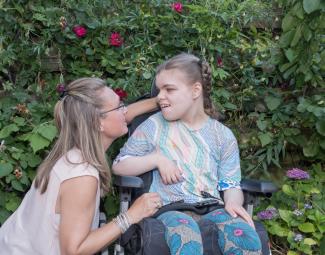
Key Considerations When Hiring a Caregiver for a Child with Special Needs
Choosing a caregiver for your child with special needs is a significant decision that requires careful consideration. The caregiver will play a vital role in your child's daily life, providing support, care, and assistance. It's essential to select a caregiver who is well-suited to meet the unique needs of your child and create a safe and nurturing environment. In this article, we will discuss important considerations when choosing a caregiver for your child with special needs.
1. Understanding of your child's needs
The chosen caregiver should have a thorough understanding of your child's specific needs, including their medical condition, developmental stage, and any behavioral or sensory challenges they may face. Inquire about their experience with children who have similar needs and their ability to adapt to different situations. A caregiver who has a deep understanding of your child's needs will be better equipped to provide the necessary care and support.
2. Experience and training
Consider the caregiver's experience and training in dealing with children with special needs. Ask about any relevant certifications, courses, or specialized training they have completed. Knowledge of strategies for communication, behavior management, and therapeutic techniques can greatly enhance the quality of care your child receives and ensure their well-being.
3. Compatibility and relationship-building skills
Choosing a caregiver who is compatible with your child's personality, interests, and communication style is crucial. The caregiver should have the ability to build a trusting and positive relationship with your child. Consider whether the caregiver possesses the necessary skills to engage your child in stimulating activities and foster their development and socialization with others.
4. Reliability and dependability
Reliability and dependability are critical qualities to look for in a caregiver. Your child relies on consistent routines and schedules, so it is important to choose someone who can adhere to these routines and provide a stable and secure environment. Inquire about their availability and commitment to the agreed-upon schedule to ensure they can meet your child's needs consistently.
5. Patience and empathy
Caring for a child with special needs often requires an extra level of patience and empathy. Find out if the caregiver demonstrates patience, understanding, and the ability to remain calm in challenging situations. A caregiver who can empathize with and understand your child's unique experiences can provide the support and emotional stability your child needs.
6. Safety measures and emergency preparedness
Ask about the caregiver's knowledge of safety measures specific to your child's needs. Inquire about their ability to handle emergencies, administer medication, and follow any medical protocols. Good judgment, quick thinking, and the ability to respond appropriately in emergency situations are essential qualities to ensure your child's safety.
7. Communication and collaboration
Effective communication and collaboration between the caregiver, you, and any other professionals involved in your child's care are key to providing the best support for your child. Ensure that the caregiver understands the importance of regular communication and is willing to provide updates on your child's progress, challenges, and any changes in their needs. Discuss their willingness to work collaboratively with you and any other therapists, teachers, or healthcare providers involved in your child's care.
Conclusion
Choosing a caregiver for your child with special needs requires careful consideration of their understanding of your child's needs, experience and training, compatibility, reliability, patience, safety measures, and communication skills. By thoroughly assessing these factors, you can make an informed decision that will provide your child with the care, support, and nurturing environment they require. Remember, open and honest communication with potential caregivers is essential to ensure they can meet your child's needs effectively.
